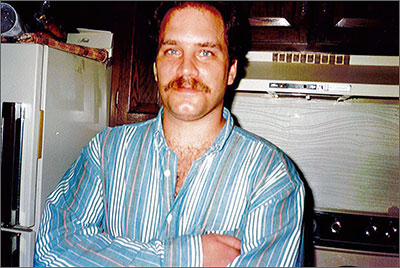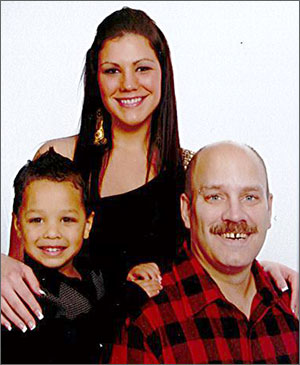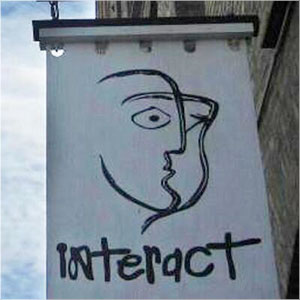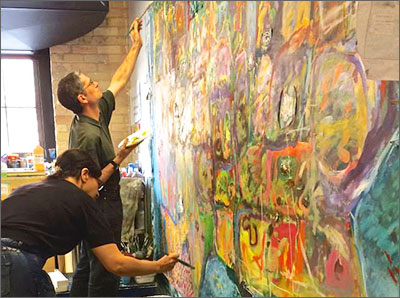
Judy Soderberg has been a member of Hennepin Health’s Care Model Committee since 2012. While most of the committee is composed of employees from Hennepin County Medical Center, NorthPoint Health and Wellness Center, Metropolitan Health Plan, and Hennepin County’s Human Services and Public Health Department — Hennepin Health’s four partners — Judy is retired and a volunteer. One reason why she’s interested in Hennepin Health is because the program provides health care for many people with mental health concerns. Soderberg’s son Shean has paranoid schizophrenia.
Thanksgiving Day
“I call [Shean’s schizophrenia] ‘the journey,’” Soderberg said, over coffee at a Dunn Brothers at Hennepin County Medical Center. “You don’t know about mental illness, it may not be part of your knowing, unless it comes to you in some way.” For Soderberg, that journey into knowing began on a Thanksgiving Day about 25 years ago, when Shean was in his early twenties.
Soderberg recalled that because of their busy schedules she’d seen Shean infrequently in the months leading up to that life-changing day. When he arrived at her house on Thanksgiving, he appeared agitated and began pacing. He then left abruptly — in Soderberg’s car — and didn’t tell anyone where he was going.
When Shean returned a few hours later, Soderberg learned that he had totaled her vehicle in Saint Louis Park.
Soderberg’s oldest son Aaron took Shean to Hennepin County Medical Center. A string of hospitalizations followed. When Shean was diagnosed with schizophrenia during one of these hospitalizations, Soderberg committed to learning everything she could about mental illness.
Soderberg explained that a few months before that Thanksgiving Day, Shean had been in a bicycle accident near Lake Calhoun and suffered a traumatic brain injury. To this day, it’s unclear how much of Shean’s behavior can be attributed to his traumatic brain injury versus his schizophrenia.
The aftermath
Soderberg noted that the years immediately following Shean’s diagnosis were particularly difficult. Shean was hospitalized repeatedly, including two hospitalizations at Anoka-Metro Regional Treatment Center for almost two years each time. Between hospitalizations, he lived in different places, including a group home and a board and lodge; for a while, he lived on the streets. Because Shean didn’t want to accept that he had schizophrenia, he resisted taking his prescriptions.
Soderberg believed that the turning point came when Shean was able to come to peace with his diagnosis and, consequently, be compliant with his medications.
Another turning point occurred when Soderberg, her ex-husband, and their two other children — Aaron and Jennifer — came to a mutual understanding that supporting Shean was “a family operation.” “The expectation in our family is that everyone does something,” Soderberg said. She characterized her role as Shean’s “unofficial case manager.”
Shean today
Today Shean lives in a supportive housing unit in Minneapolis. He is a Medicaid recipient. He also qualified for a Brain Injury Waiver through the state of Minnesota. The waiver covers a number of services, including an independent living services (ILS) worker. Shean’s ILS worker visits him once per week to help him with paperwork, grocery shopping, banking, and more.

Shean today, with his daughter and grandson
Shean’s involvement in the Interact Center — which is also funded through the waiver — has been particularly pivotal. Located in Minneapolis’ North Loop, Interact is a visual and performing arts center for artists with disabilities. Shean, who is in the performing arts track, typically spends three to five days per week at the center. Soderberg said that Interact has given Shean a sense of purpose, structure in his day, and new friends.

The Interact Center is located at 212 3rd Avenue North #140
Soderberg as an advocate
Because of her personal experiences, Soderberg has become a mental health advocate. “I look at myself as a reality check for people,” she said about her involvement with Hennepin Health’s Care Model Committee.
One of the realities she is particularly passionate about sharing is the state of transitional care (the health care a patient receives as they move from one level of care to another, such as from a hospital to home). Soderberg recalled an occasion when Shean struggled after his discharge from the hospital because no one had helped him set up his medications.
Support
Do you have a family member or a friend with a mental illness? Here are four resources that Soderberg recommended:
Hennepin County Adult Mental Health Local Advisory Council (LAC)
National Alliance on Mental Illness (NAMI)
NAMI has a number of Minnesota chapters
Mental Health Association of Minnesota
Article appeared in the May 2014 Hennepin Health newsletter and is available here.


2 Responses to “Shean’s Schizophrenia”
Lynda Lackner
My 34 year old son has been experiencing /schizophrenia symptoms. He has not been officially diagnosed yet. After an extremely successful business career he suddenly checked out emotionally and mentally. BUT an artist was born! Where it came from no one knows. I was curious if this common with schizophrenia or just a hidden talent the brain has been hiding. Would appreciate any advise on this subject. Maybe what God takes away, he replaces with another gift. Thank you… Lynda in Texas
Lori
Hi Lynda,
Thanks for reading my article. I wish I could give you advise, but I’m not a health care provider. I ran across this website online, though (http://www.sardaa.org/) and it looks like they may have some excellent resources for you and your son. Sending you the best thoughts.
-Lori